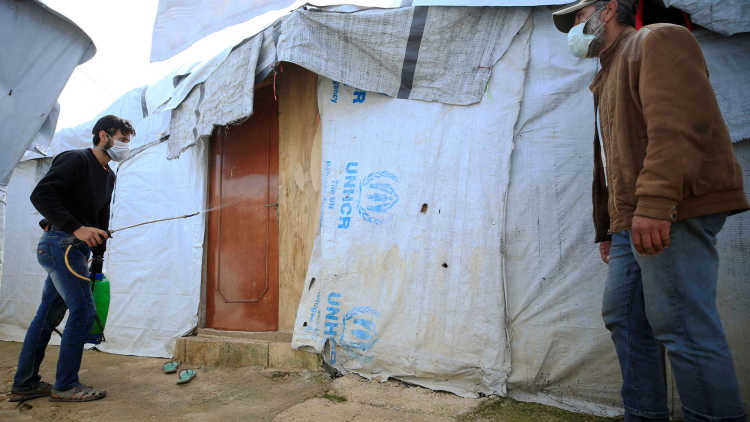In Brief | 13/07/2020
COVID-19 in the Middle East and North Africa and Its Impact on Migration
Many refugees and migrant workers in the Global South must thwart curfews in order to make a living.

COVID-19 has hit the Middle East and North Africa (MENA) at a time when oil prices, coping capacities, and the legitimacy of regional regimes were already weak. The economic impact of COVID-19 threatens to undermine social contracts and political stability, since it will affect domestic spending and is already exacerbating pre-existing crises and inequalities. The pandemic also has the potential to shake up geopolitical dynamics, as it will reduce the ability of key actors such as Iran, Russia, and the United States to intervene regionally. The pandemic will thus likely reinforce trends towards populism and authoritarian restoration. Battling it requires government intervention on a large scale, and such intervention will also be used to further the political goals of authoritarian regimes. State measures dealing with COVID-19 are being integrated into their repression strategies – this includes cyber-surveillance – and will likely outlast the health crisis itself, as is already discernible. Although the median age of the population is relatively low – which, reportedly, should somewhat reduce vulnerability – the capacities of regional healthcare systems are meagre in comparison to those of international peers. The COVID-19 crisis is revealing deep-seated problems in healthcare systems across the MENA region, which in turn is deepening the crisis of mistrust among citizens vis-à-vis political leadership.
Worldwide, the coronavirus crisis has revealed existing inequalities in an unfamiliar way: Usually, it is the well-off who have the privilege of (volitional) mobility, but in COVID-19 times, privilege translates to being well-off enough to afford to #stayathome: It is not only those who work in vital professions but also migrants who move about; the latter often cannot afford to stay put. Many refugees and migrant workers in the Global South are forced to thwart curfews in order to make a living – indeed, a huge number have even had to return to rural regions or even conflict areas to find shelter and survive. In other cases, migrants have been either imprisoned in degrading conditions or forcibly deported, the health risks inherent in both having been ignored by the respective governments. Border closures and mobility restrictions have substantially increased their vulnerability. In early April 2020, for example, hundreds of thousands of Venezuelan refugees and migrants returned home from Colombia after facing evictions and losses of income. Most of them had been working in the informal economy. The main reason for this mass return was that it became impossible to cover daily needs in Colombia. However, only those who have something to return to – a place to live, people to reconnect with, a business or a farm that could provide them with a livelihood – have the ability to move; others have become forcibly immobile and find themselves in an extremely volatile situation. Similar dynamics were observed in India, where in March a lockdown was declared with only four hours’ notice; work and wages immediately dried up, and millions of Indian migrant workers were forced to return home on foot.
Since the so-called “refugee crisis” in 2015, the MENA region has been in the spotlight in the European media for its inhabitants’ forced migration to Europe, mainly from Syria and Iraq. The MENA region has also developed into a transit space for refugees from adjacent regions such as the Sahel, the Horn of Africa, and Afghanistan. However, the large majority of migrants and refugees stay and move about within the MENA region itself. We have argued in an earlier GIGA Focus that refugees, internally displaced persons, and labour migrants belong to the most vulnerable populations in the MENA region, alongside other at-risk groups such as the poor, the prison population, and the elderly. The COVID-19 crisis and the countermeasures being employed are exacerbating pre-existing inequalities in various ways and disproportionately affecting the lives of migrants and refugees, as they are hit particularly hard by insufficient access to healthcare and dwindling work opportunities.
For example, since 2011, 6.1 million Syrians have been internally displaced (IDMC, 2018), 5.5 million have fled to Syria’s neighbouring countries in the Middle East, and approximately one million have fled to Europe (UNHCR, 2019). The majority of Syrians in the region work in the informal economy, which has suffered greatly from the lockdown. In early April, a Syrian refugee set himself on fire in Lebanon over the increasingly desperate economic situation after many refugees lost their jobs as day labourers. Their economic vulnerability leads large numbers of refugees to disobey the imposed curfews. In Turkey, the police recently killed a Syrian teenager who was on his way to work despite the curfew. The COVID-19 restrictions in the Middle East and the concomitant loss of jobs will also have a huge impact on Syria’s population, which strongly relies on remittances from abroad. According to the World Bank, USD 1.6 billion in remittances flow into Syria every year, comprising almost 15 per cent of nominal GDP, according to the latest estimates. Most remittances are sent home from family members working in Syria’s neighbouring countries. Furthermore, some Gulf countries, which host the majority of the estimated 23 million migrant workers in the Arab states, have started to expel undocumented migrants amidst the corona crisis: In April, the United Arab Emirates and Saudi Arabia deported Ethiopian migrant workers back to Addis Ababa, falsely claiming that Ethiopians are prone to spreading the virus.
In North Africa, living conditions of migrants and refugees have also further deteriorated: In Libya, thousands of refugees and migrants continue to be imprisoned in detention centres, where an outbreak of coronavirus would amount to a death sentence for many of them. Similarly, in Tunisia, many asylum seekers and students from sub-Saharan Africa have found themselves in a situation of extreme insecurity since the start of confinement, as they are unable to pay their rent and other most basic needs. Conditions in detention centres in Tunisia are alarming: In April 2020, migrants held at the Wardia detention centre launched a hunger strike, protesting the insufficient medical care amid the ongoing COVID-19 pandemic. At the same time, some Tunisian workers in Libya managed to return home: Hundreds of Tunisians forced their way to the Ras Jedir border post to flee Libya when confinement measures started. Other migrants have been compelled to leave by government order, as deportations from Europe to North Africa continue amidst the pandemic: in spring, for example, Spain, in cooperation with Tunisian authorities, deported 600 Tunisians from Melilla, leading to a massive outcry from Tunisian civil society organisations to suspend expulsion procedures.
In conclusion, COVID-19 and its economic and socio-political consequences will force states in the MENA region to address social ills – including the issue of migrants’ and refugees’ rights – in a context characterised by mobilisation and dissatisfaction even before the pandemic. The global spread of COVID-19 has led to unprecedented demands on the state, and the pandemic has accelerated previously existing divisions within societies. Regimes of all types around the world are currently being stress-tested, and politicians are facing severe criticism for the way they have handled the crisis. Regimes in the MENA region are thus bound to face new waves of political upheaval if they continue to fail to guarantee basic rights and provide basic services to their citizens.


